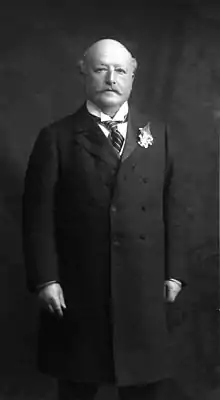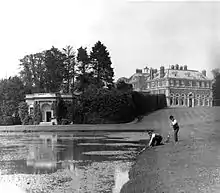Edward Levy-Lawson, 1st Baron Burnham
Edward Levy-Lawson, 1st Baron Burnham, KCVO (28 December 1833 – 9 January 1916), known as Sir Edward Levy-Lawson, 1st Baronet, from 1892 to 1903, was an English newspaper proprietor. He was the owner and publisher of the Daily Telegraph.
The Lord Burnham | |
|---|---|
 | |
| Born | Edward Levy 28 December 1833 London, England |
| Died | 9 January 1916 (aged 82) Forest Gate, London, England |
| Burial place | Beaconsfield, Buckinghamshire, England |
| Education | London University School |
| Spouse(s) | Harriette Georgiana Webster
(m. 1862; died 1897) |
| Children | 3, including Harry |
| Parents |
|

Biography
Edward Levy-Lawson was born Edward Levy, in London, on 28 December 1833, the son of Joseph Moses Levy and his wife Esther (née Cohen). In December 1875 his name was legally changed to Levy-Lawson. He was educated at University College School in Hampstead, London. His father had acquired the Daily Telegraph – known as The Daily Telegraph and Courier – in 1855, only months after its founding. Levy-Lawson was editor and in control of the paper long before his father's death in 1888. From 1885, he was managing proprietor and sole controller of his renamed Daily Telegraph and became even more influential than his father on Fleet Street.
In 1875, he assumed by royal licence the surname of Lawson in addition to and after that of Levy. He bought the Hall Barn estate in 1880. He was created a Baronet, of Hall Barn in the County of Buckingham, in 1892, and in 1903 he was raised to the peerage as Baron Burnham, of Hall Barn in the Parish of Beaconsfield in the County of Buckingham. In 1886, he was appointed High Sheriff of Buckinghamshire.[1]
Personal life
Levy-Lawson's family was Jewish.[2] He married Harriette Georgiana Webster, daughter of Benjamin Nottingham Webster, at Parish Church, Kennington, Kent, in 1862. They had three children together, Harry (later Viscount Burnham), William and Edith. Lady Burnham died in 1897.
Since being given lordship, Lord Burnham's love of pheasant shooting resulted in him enjoying a close relationship with King Edward VII, his son, King George V, and his son King Edward VIII, with King George paying yearly visits to him at his home, the 4,000 acre estate Hall Barn.[3][4][5] On 18 December 1913, it was recorded by the Prince of Wales himself – later King Edward VIII – that he and his father King George had "shot over a thousand pheasants in six hours – about one bird every 20 seconds". Altogether, 3,937 pheasants were killed. While it has been said that the shoot was not a slaughter and that very respectable birds were presented to the Guns, on the train journey home, the Prince of Wales noticed that the King was unusually quiet, his silence eventually broken when he famously said: "Perhaps we overdid it today."[6][7][8][9][10]
Lord Burnham died on 9 January 1916, aged 82, in Forest Gate, London, and was succeeded in the barony by his eldest son Harry. He was buried in Beaconsfield, Buckinghamshire.[11]
Notes
- "No. 25566". The London Gazette. 9 March 1886. p. 1136.
- Rubinstein, William D.; Jolles, Michael; Rubinstein, Hilary L. (22 February 2011). The Palgrave Dictionary of Anglo-Jewish History. ISBN 9781403939104.
- Hall, J. (1997). Max Beerbohm Caricatures. Yale University Press 1997. ISBN 0300072171. Retrieved 22 July 2016.
Lord Burnham was a close friend to Edward VII - who as both Prince of Wales and as King paid yearly visits to Hall Barn, home of Lord Burnham...
- Thompson, F. (5 April 2001). Gentrification and the Enterprise Culture : Britain 1780-1980: Britain 1780-1980. O.U.P. 2001. p. 72. ISBN 9780191581595. Retrieved 22 July 2018.
- Rose, Kenneth (1983), King George V, London: Weidenfeld and Nicolson pp. 39–40
- Heffer, S. (21 September 2017). The Age of Decadence: Britain 1880 to 1914. Random House, 21 Sep. 2017. ISBN 9781473507586. Retrieved 22 June 2016.
On 18th December, 1913, Lord Burnham invited the king and his elder son, the Prince of Wales, later King Edward VIII, to join....
- H.R.H. King Edward VIII (Windsor), pp. 86–87 A King's Story, London: Cassell and Co. 1951
- Thompson, F. (5 April 2001). Gentrification and the Enterprise Culture : Britain 1780-1980: Britain 1780-1980. O.U.P. 2001. p. 72. ISBN 9780191581595. Retrieved 22 July 2018.
- "Fieldsports Magazine - Hall Barn, then and now". Retrieved 23 July 2015.
(At Hall Barn) the 1913 team of Guns included HRH King George V, the Prince of Wales, Lord ‘Bertie' Vane Tempest, the Honourable Harry Stonor, Lord Dalhousie, Lord Charles Fitzmaurice and Lord Ilchester...While it has been said that the shoot was not a slaughter and that very respectable birds were presented to the Guns, on the train journey home, the Prince of Wales noticed that the King was unusually quiet, his silence eventually broken when he said: “Perhaps we overdid it today.”.
- Holland, E. (12 January 2014). "Edwardian England: A Guide to Everyday Life, 1900-1914". Plum Bun Publishing, 12 Jan. 2014 -. Retrieved 13 August 2017.
....led to the most infamous shooting in 1913 at Hall Barn, a Buckinghamshire estateowned by Lord Burnham, of 3,937 pheasants— which led to even King George V remarking “perhaps we overdid it today.” Against the boom of guns, ladies usually ...
- "Person Page". www.thepeerage.com. Retrieved 3 March 2019.
References
- Kidd, Charles, Williamson, David (editors). Debrett's Peerage and Baronetage (1990 edition). New York: St Martin's Press, 1990,
- Leigh Rayment's Peerage Pages
- Lundy, Darryl. "FAQ". The Peerage.
External links
![]() Media related to Edward Levy-Lawson at Wikimedia Commons
Media related to Edward Levy-Lawson at Wikimedia Commons
| Peerage of the United Kingdom | ||
|---|---|---|
| New creation | Baron Burnham 1903–1916 |
Succeeded by Harry Levy-Lawson |
| Baronetage of the United Kingdom | ||
| New creation | Baronet (of Hall Barn) 1892–1916 |
Succeeded by Harry Levy-Lawson |